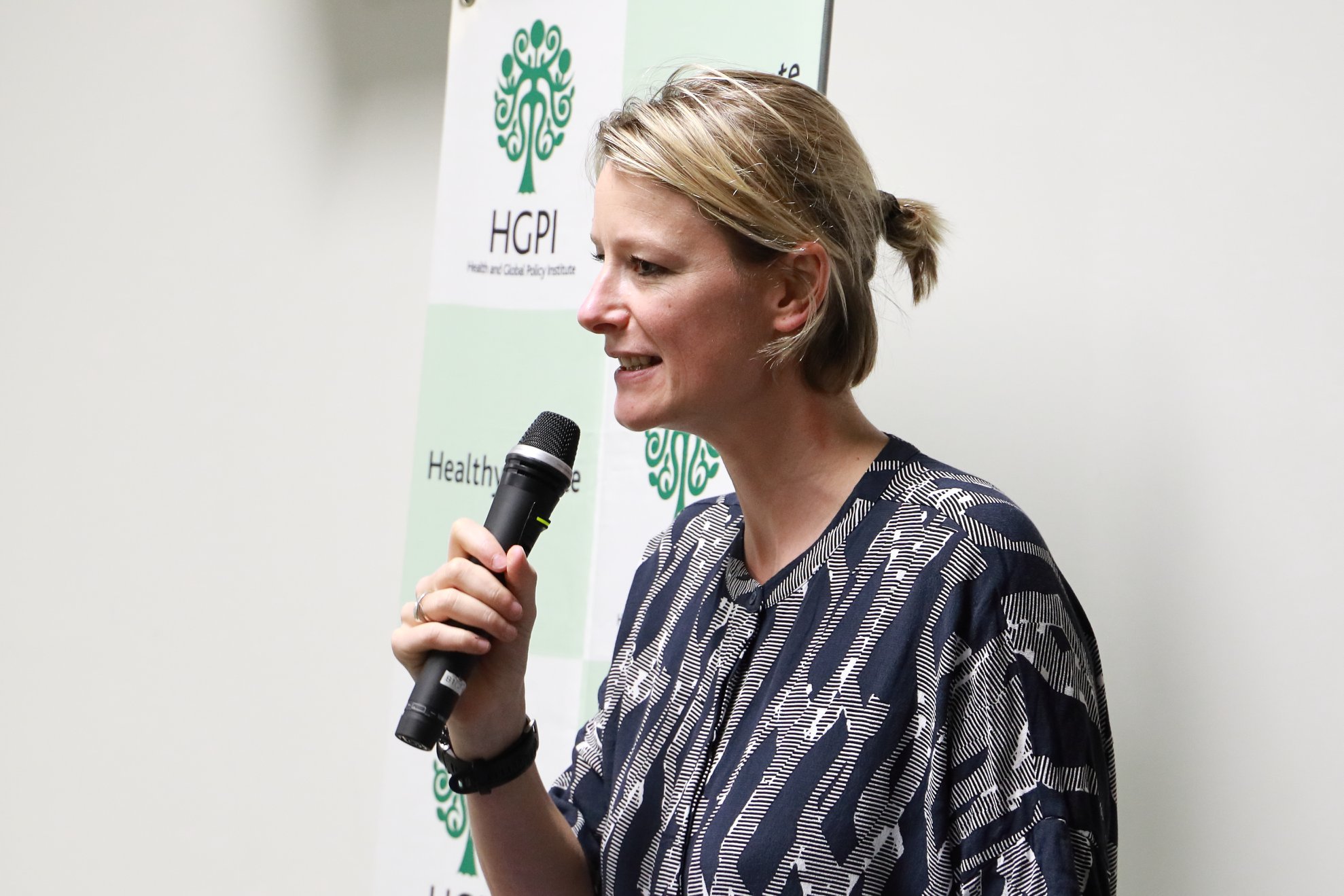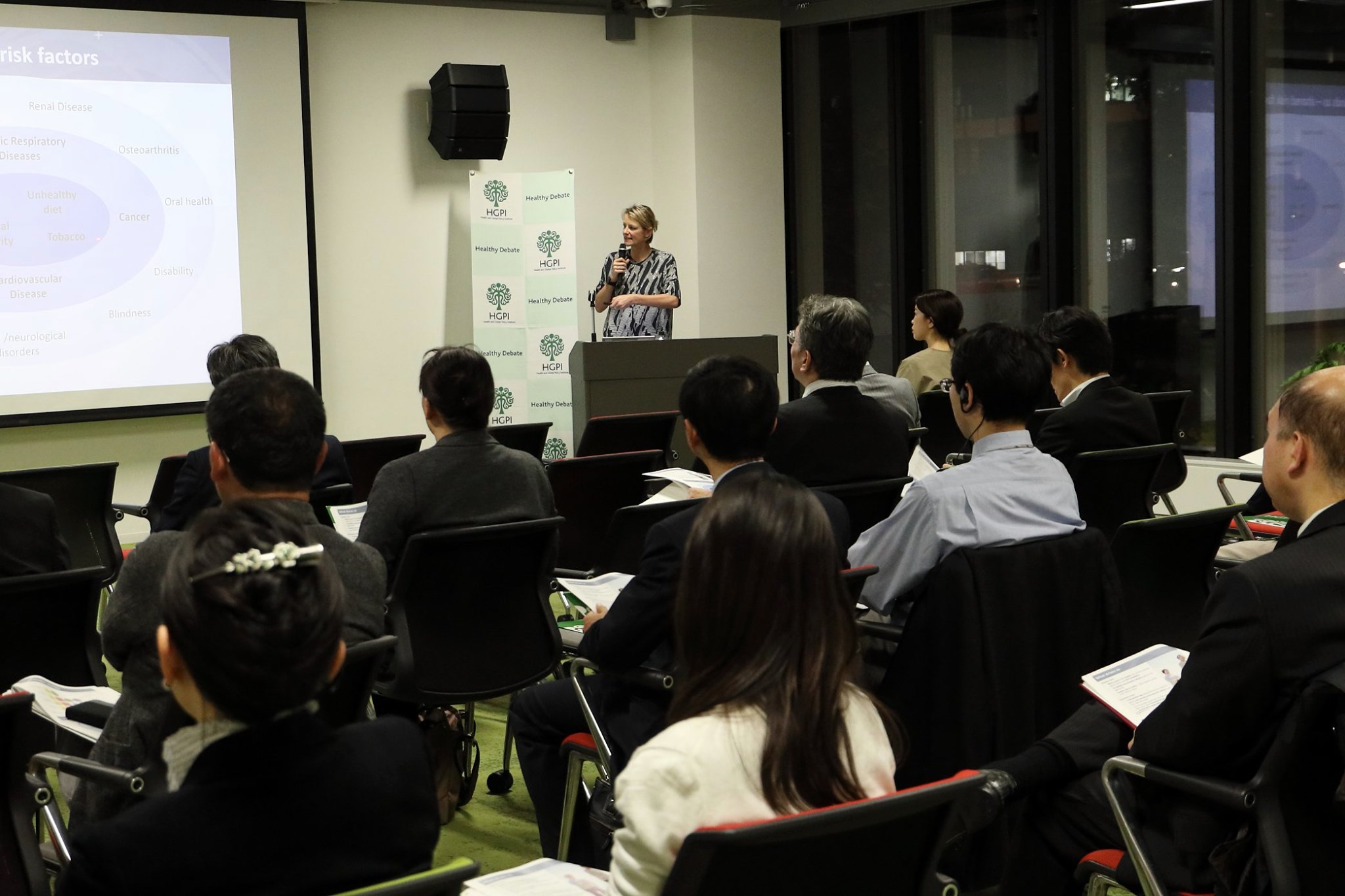[Event Report] The Evening Seminar -Steps to finding a shared agenda and building a coordinated response in NCD advocacy (November 14, 2019)
date : 12/25/2019
Tags: HGPI Seminar, NCDs
![[Event Report] The Evening Seminar -Steps to finding a shared agenda and building a coordinated response in NCD advocacy (November 14, 2019)](https://hgpi.org/en/wp-content/uploads/sites/2/80222623_140172164087226_6577429650010537984_o.jpg)
NCDs such as cardiovascular diseases (CVDs), cancers, diabetes, chronic respiratory diseases, as well as mental and neurological disorders have become the leading cause of death worldwide.
NCD Alliance Japan has served since 2013 as Japan’s point-of-contact for the NCD Alliance*, a collaborative platform for civil society organizations in the NCD community. The Alliance provides a level playing field for multi-stakeholder discussion, disseminating both at home and abroad the vital role played by civil society in the fight against NCDs. To further advance comprehensive, cross-cutting NCD measures, the decision was made in October 2019 to renew NCD Alliance Japan and to reinitiate its activities.
For this event, we were joined by Ms. Katie Dain, the CEO of NCD Alliance. Ms. Dain spoke about the importance of civil society’s role in NCD prevention and control as well as methods for deepening the impact of advocacy activities. Through the presentation and following question and answer session, we deepened the discussion on these topics with everyone in attendance.
*NCD Alliance: A collaborative platform bringing together over 2000 civil society organizations/academic institutions in more than 170 countries. HGPI has been officially recognized as a full member of the NCD Alliance since January 17, 2019.
*NCD Alliance Japan is granted permission to use the word “NCD” by National Clinical Database.
■ Introducing the activities of the NCD Alliance
To act against various problems related to NCDs, the NCD Alliance was formed in 2009 by four international organizations: the International Diabetes Federation (IDF), the Union for International Cancer Control (UICC), the World Heart Federation (WHF), and The Union: International Union Against Tuberculosis and Lung Disease. Since its founding, NCD Alliance operations have expanded to 170 countries to form a network of more than 2,000 organizations to provide a cooperative platform for civil society. It has formed NCD alliances in 65 countries and regions.
NCDs are chronic diseases such as cancer, diabetes, cardiovascular diseases, chronic respiratory diseases, and mental and neurological disorders. As the cause of approximately 71% of deaths worldwide, NCDs kill 41 million people each year. Approximately 15 million people killed by NCDs are under age 60. These deaths are preventable. Although it is estimated that NCDs will cause $47 trillion in total damages to the world economy over the next two decades, NCD control measures have not advanced. NCDs are particularly damaging to low income and middle-income countries, where they cause significant problems for national economies by driving people into poverty.
Since its founding, the NCD Alliance has focused its efforts on what are considered the four main risk factors of NCDs: alcohol, tobacco, unhealthy diet, and physical inactivity. Currently, it has expanded its activities to include countermeasures for HIV, tuberculosis, and various diseases associated with mental disorders.
NCDs are not only influenced by individual lifestyles. They are significantly affected by factors in society and the environment such as socioeconomic circumstances, culture, and climate. Therefore, while collecting the stories and opinions from people with NCDs, NCD Alliance advocacy activities have expanded in recent years to include topics such as the incorporation of NCD control measures in the healthcare systems of each country and region, the creation of systems for providing appropriate primary care, and the procurement of funding to assist health development.
In the early days of the NCD Alliance after its establishment in 2009, its focus was mainly on advocacy activities for building awareness of NCDs as a political issue such as through participation in high-level meetings on NCDS at the United Nations General Assembly. Currently, in addition to advocacy, NCD Alliance activities include monitoring the progress in each government of systems and efforts for NCD control, capacity-building for members of civil society, and sharing best practices in each country and region.
■Lessons from past activities on finding shared agendas and building coordinated responses in NCD advocacy
Advocating as an alliance holds many merits:
– It enables more rapid problem-solving.
– It becomes possible for alliance members to cooperate on shared priority issues.
– Alliance members gain access to more resources.
– Each participating organization has its own strengths, such as fundraising or engaging in evidence-based advocacy. Working as an Alliance allows members to benefit from each other’s strengths.


In the decade of activity since its establishment, the NCD Alliance has learned that it is possible to achieve goals more quickly by advocating on a level that engages all of civil society rather than small-scale activities while effectively using the resources possessed by each individual and organization in the alliance such as the information, funding, and strengths as mentioned in the benefits listed above. On the other hand, cooperation is not easy. It has proven difficult to share common challenges and goals and some members are concerned that the NCD Alliance does not accurately reflect the ideals of each participating individual and organization. Therefore, particular care is necessary to identify goals and to decide who will cooperate with whom and how they will achieve their goals.
In the early days after an alliance has been established, it is particularly important to set clear and attainable goals, expand activities strategically, and steadily build a performance record. NCDs include a wide variety of diseases and factors, making it impossible to solve everything at once. During this period, efforts must be adjusted to fit political circumstances and the environment. At the same time, it is important to reach decisions rapidly and focus efforts on priority issues with each member striving to communicate clearly and effectively. Doing so not only leads to achieving goals, it reinforces a system for cooperation over the course of activities. It is wise to set easily-attainable goals at the start, then gradually expanding the range of activities.
It is also necessary to form a strategy concerning who to involve. Organizational or societal reform can be achieved by involving a wide variety of partners such as key organizations or individuals for achieving goals or organizations concerned with NCDs. The NCD Alliance, for example, has formed partnerships with women’s rights groups, environmental groups, and financial institutions in addition to each country’s government institutions, international organizations such as the World Health Organization (WHO), organizations involved in health and healthcare, and organizations representing people with NCDs.
After setting clear goals and building strong relationships of trust with appropriate partners, organizational guidance is important to enhance the sustainability of the alliance. In addition to clarifying who is responsible for decision-making and establishing a secretariat office, activities can be made more precise by creating reports and other documents that clearly display results for each activity and by receiving evaluations from third parties. Most important of all is listening to the stories and opinions of people living with NCDs. Understanding their needs leads to appropriate policy proposals and activities. We believe this is the NCD Alliance’s reason to exist.
(Photographed by: Kiyoshi Takahashi)
■Profile
Ms. Katie Dain
Katie Dain is Chief Executive Officer of the NCD Alliance, a global network of civil society organisations dedicated to transforming the fight against non-communicable diseases (NCDs). Katie has worked with the NCD Alliance since its founding in 2009. Katie is widely recognised as a leading advocate and expert on NCDs.She is currently a member of the WHO Independent High-Level Commission on NCDs, co-chair of the WHO Civil Society Working Group on the UN High-Level Meeting on NCDs, and a member of The Lancet Commission on NCDIs of the Poorest Billion. Her experience covers a range of sustainable development issues, including global health, gender equality and women’s empowerment, violence against women, and women’s health. Before joining the NCD Alliance, she held a series of policy and advocacy posts in international NGOs and government, including the International Diabetes Federation (IDF) in Brussels, leading their global policy and advocacy programme; the UK Government as a gender policy adviser; Womankind Worldwide, a women’s rights organisation;and the Terrence Higgins Trust(THT), a HIV and sexual health charity. She has a BA in History from Sheffield University, and a Master’s degree in Violence, Conflict and International Development from the School of Oriental and African Studies (SOAS), London.
Top Research & Recommendations Posts
- [Research Report] Perceptions, Knowledge, Actions and Perspectives of Healthcare Organizations in Japan in Relation to Climate Change and Health: A Cross-Sectional Study (November 13, 2025)
- [Research Report] The 2025 Public Opinion Survey on Healthcare in Japan (March 17, 2025)
- [Policy Recommendations] Mental Health Project: Recommendations on Three Issues in the Area of Mental Health (July 4, 2025)
- [Policy Recommendations] Developing a National Health and Climate Strategy for Japan (June 26, 2024)
- [Research Report] The 2023 Public Opinion Survey on Satisfaction in Healthcare in Japan and Healthcare Applications of Generative AI (January 11, 2024)
- [Policy Recommendations] Recommendations on Strategic Investments in Policies for Brain Health to Revitalize Japan: Hopes for the New Administration (December 1, 2025)
- [Policy Recommendations] Reshaping Japan’s Immunization Policy for Life Course Coverage and Vaccine Equity: Challenges and Prospects for an Era of Prevention and Health Promotion (April 25, 2025)
- [Announcement] HGPI Endorses the “Belém Health Action Plan” (November 14, 2025)
- [Announcement] HGPI Joins Global Green and Healthy Hospitals (August 1, 2023)
- [Research Report] Survey of Japanese Nursing Professionals Regarding Climate Change and Health (Final Version) (November 14, 2024)
Featured Posts
-
2025-12-09
[Event Report] Special Seminar “Rising to New Challenges in Health Sciences for Future Society: Novel Developments in the Field of Epilepsy in Japan and Globally” Belgium Pavilion Special Seminar, World Expo 2025 Osaka, Kansai (September 18, 2025)
![[Event Report] Special Seminar “Rising to New Challenges in Health Sciences for Future Society: Novel Developments in the Field of Epilepsy in Japan and Globally” Belgium Pavilion Special Seminar, World Expo 2025 Osaka, Kansai (September 18, 2025)](https://hgpi.org/en/wp-content/uploads/sites/2/HGPI_20250805_mental-health-expo-eyechatch.png)
-
2025-12-11
[Event Report] Core Components of Universal Health Coverage (UHC): Achieving “Healthcare Without Financial Hardship” in Asia-Pacific and Japan (December 5, 2025)
![[Event Report] Core Components of Universal Health Coverage (UHC): Achieving “Healthcare Without Financial Hardship” in Asia-Pacific and Japan (December 5, 2025)](https://hgpi.org/en/wp-content/uploads/sites/2/HGPI_20251210_Core-Components-of-Universal-Health-CoverageUHC-top.jpg)
-
2025-12-12
[Registration Open] Meaningful Involvement Promotion Project Urgent Symposium “The New Takaichi Administration and Central Social Insurance Medical Council Reform – Ensuring Patients’ Voices are Heard” (January 22, 2026)
![[Registration Open] Meaningful Involvement Promotion Project Urgent Symposium “The New Takaichi Administration and Central Social Insurance Medical Council Reform – Ensuring Patients’ Voices are Heard” (January 22, 2026)](https://hgpi.org/en/wp-content/uploads/sites/2/HGPI_20251208_urgent-symposium-1.png)
-
2025-12-12
[Registration Open] (Webinar) The 140th HGPI Seminar “Early Detection to Reduce COPD Disease Burden: Connecting Clinical Frontiers with Health Policy” (January 27, 2026)
![[Registration Open] (Webinar) The 140th HGPI Seminar “Early Detection to Reduce COPD Disease Burden: Connecting Clinical Frontiers with Health Policy” (January 27, 2026)](https://hgpi.org/en/wp-content/uploads/sites/2/hs140-top.png)
-
2025-12-16
[Discussion Points] Policy Dialogue “Considering Comprehensive Genomic Profiling from the Perspective of Patient Access: Utilizing the Medical Service Fee Reimbursement System and the Mixed Medical Services Program to Meet the Needs of Today” (November 28, 2025)
![[Discussion Points] Policy Dialogue “Considering Comprehensive Genomic Profiling from the Perspective of Patient Access: Utilizing the Medical Service Fee Reimbursement System and the Mixed Medical Services Program to Meet the Needs of Today” (November 28, 2025)](https://hgpi.org/en/wp-content/uploads/sites/2/eyecatch_Policy-Dialogue_Discussion-Points_20251128.jpg)




